The Crusader Kings franchise sits in a weird and unique territory. When you look at it from afar, it seems like your traditional war strategy game, with resources to earn, buildings to keep, and maps to conquer. You start small, build up your forces, and ultimately conquer this medieval world ravaged by war. If closely approached, however, the beast reveals itself to be something else entirely.
Instead of simply playing as a strategy game, Crusader Kings puts you in the role of the head of a dynasty and pitches you with a mission that is not world conquest, but survival. Instead of simply spreading your borders and dominating Europe, Asia, or Africa, your focus should be in creating a lasting legacy, ensuring the survival of your children, grandchildren, and making your family name stand for centuries. Crusader Kings III is the latest iteration of this formula, and it comes with utterly impressive achievements.
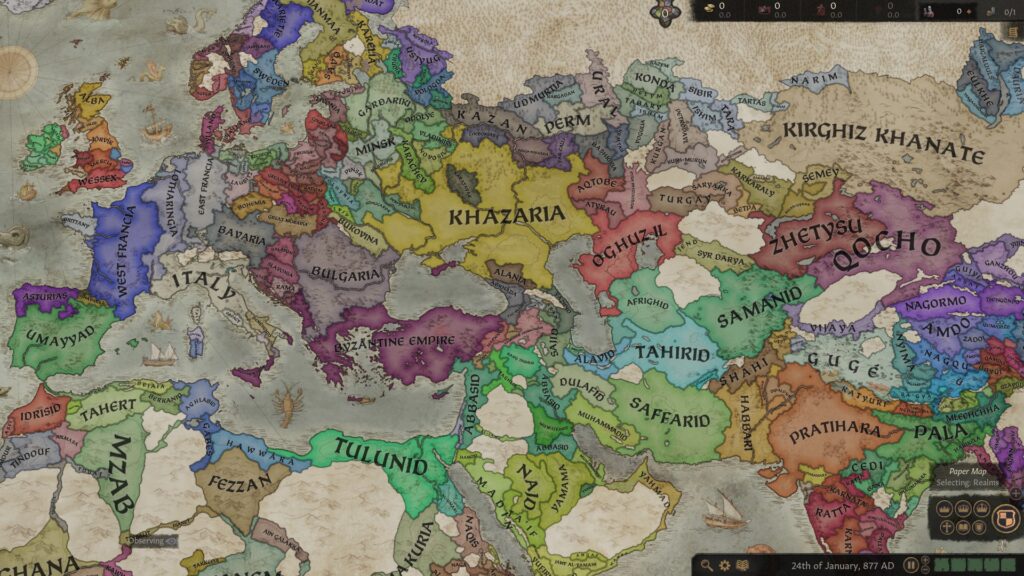
How does this work?
One of the challenges for any review of a Crusader Kings’ game is explaining how it works. I mean, this is a game where you can get married, where you marry your children, plot to murder your own family, convert to another religion, build an empire, fight civil wars, execute prisoners, host feasts, go hunting, may end up becoming a drunk or a lunatic, can die of old age or by having a heart attack due to obesity. Damn. There is A LOT in this game, and it is extremely hard to explain it to someone without actually having them to play the game for a few hours. I will try though, so bear with me.
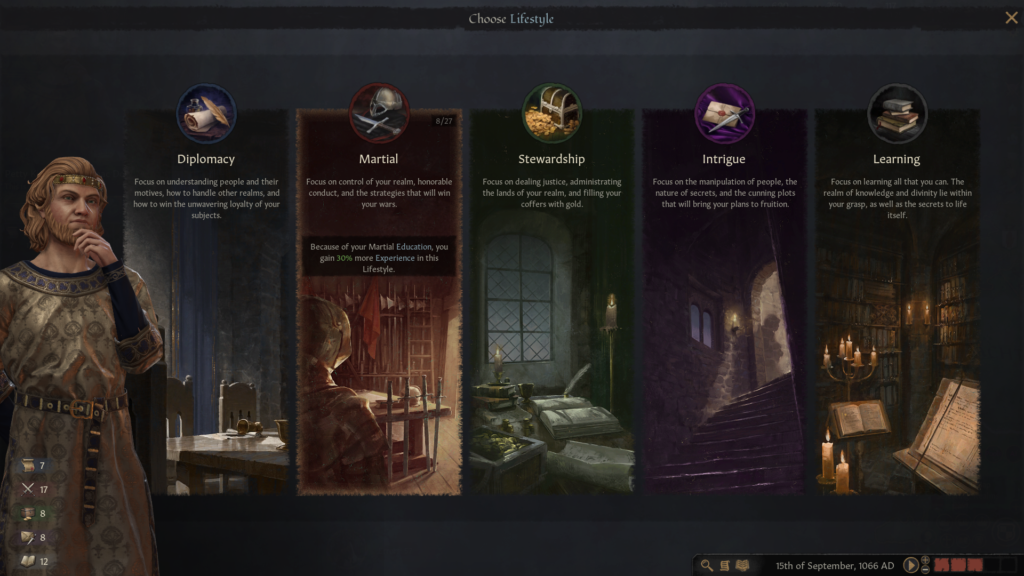
Character
The first thing you should know is that you control the head of a dynasty, a person who owns territory in Europe, Middle East, India, or Africa. You start the game by selecting from an immense array of options, from lesser nobles to emperors. It is up to you to decide if you want to start a game as a random portuguese count who answers to the King of Asturias or as the emperor of the massive Byzantine Empire. Remember, the objective here is not simply conquering the world, but ensuring your legacy survives throughout the next centuries.
This initial character, however, is just the first of many, with specific abilities that you can hone and capable of influencing how their heir is going to be when grown up. What makes every game of Crusader Kings III interesting is the fact that every character is partially randomized, you may end up controlling a duke with sadistic desires but who is so shy he cannot go outside, or maybe a king who is just and kind, but is a craven who cannot take action when needed. These characteristics are represented by traits each character have, some of them earned during childhood and part of their core personalities, others acquired during gameplay, like becoming a drunkard, partaking athletic activities, growing paranoid, or being maimed in battle. There are dozens and dozens of traits in here. There are traits that can be inherited by your children, there are traits that make you important to members of your religion, there are traits that make you constantly close to death. It is a LOT.
These traits are important in a lot of ways. For instance, the game will often prompt you with a situation, described by text, about some family members or councilors having issues with you or with each other. Selecting a certain option that goes against one of your traits may incur stress. Accumulate enough stress and you may become a drunkard, be consumed by whoring, or maybe become crazy. In a way, you will be steered to select the options that make more sense to the traits your character have, thus making them really count.
You should also combine these traits with your character’s skills, which come in the way of Diplomacy, Martial, Stewardship, Intrigue, and Learning. These five main skills will be crucial to determine how you will rule. If your character has high Martial skill, you may find better success at fighting and conquering lands during his or her reign. If your character has high Stewardship, perhaps it will be best for you to stick to your own territory and spend time upgrading your cities or making a stock of gold.
There are also plenty of others abilities for each character: Prestige is a character-bound currency that allows you to declare wars or escape bad situations simply because you are above it; Piety is another character-bound currency that allows you to declare wars against heretics of your faith, or perhaps give you a chance to reform your religion or adopt a new one; Prowess is an indicator of your fighting ability when commanding armies yourself; Dread is a measure of how fearsome you are, enabling you to keep your foes and allies in check through sheer intimidation. Once again, there’s a LOT. Yeah.
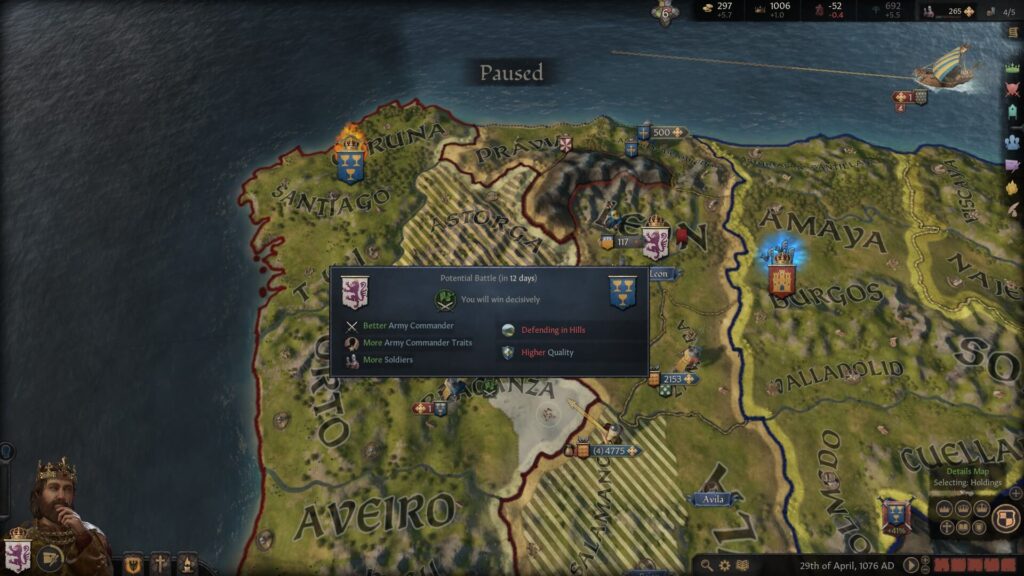
What Can You Do?
Well, yes, you have your character and all his traits, skills, and other stuff. How you use him, however, is what matters. Crusader Kings III plays out by letting the clock tick. While that happens, your neighbours will start wars, expand their territories, form alliances themselves, marry, have children, etc. This means that each character in the game is taking decisions, and those decisions are also forced upon you.
You may play actively seeking something to do, like waging wars against a neighbor, or trying to seduce the daughter of a king or plotting to kill someone who holds a piece of land you are set to inherit. You can do that by exploring the map, finding the city or kingdom you want, and interacting with mouse-clicks and picking options. Once you choose what to do, however, you should be ready to deal with the consequences.
In a way, everything you opt to do in the game will prompt a decision box, which is a textual prompt describing the outcome of your actions and giving you an array of possible reactions to it, which are limited based on your skills and traits, or may incur stress that you do not want. These decision boxes may also prompt even if you are doing nothing, with requests from allies to get their taxes cut, or maybe someone unhappy with how you are managing the kingdom. There are hundreds of possible decisions for you to make, but most of them will be based on the opinion that other characters have of you.
Opinion plays a big role in the game. Each character has an opinion value of one another, and bad opinion means these characters are less likely to hear each other, will most likely wage war against one another, and will deny any request. This also applies to you, so if you constantly ignore one of your vassals, he will be angry and may betray you at some point. Low opinion of characters may also turn into rebellions,
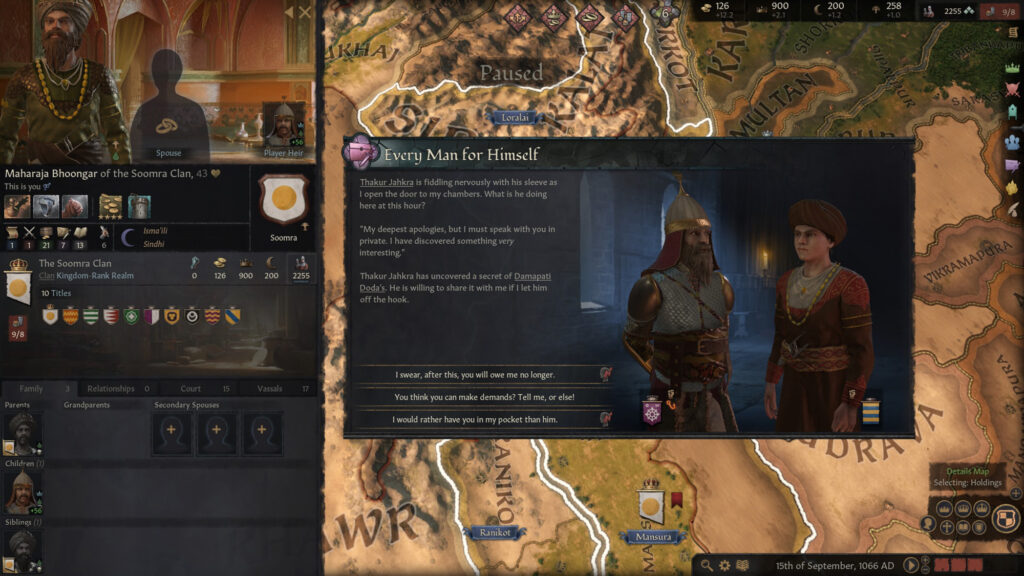
Making the Franchise Accessible
Most of those elements, however, were also present in previous games from Paradox Interactive, such as the previous Crusader Kings and the Europa Universalis franchise. What makes Crusader Kings III so much better is in many ways similar to what Monster Hunter: World did within the Monster Hunter franchise: make it a more accessible and modern game.
Previous Paradox Interactive games were clunky monsters and scary to any newcomer. The user interface seemed ancient, there were a lot of intimidating numbers on display and you had a really hard time to navigate everything. It took hours and hours of gameplay for you to grasp the basics of how those massive games worked. It was busywork to some extent, and in general the games had little exciting moments to make you feel as if your decisions were making some impact during the course of your playthrough. It was a game much like the Football Manager franchise, playing through numbers and trying to replicate realism in form of statistics and resource accumulation. It was a tough experience to get into, although they already had immense variety and replayability for those who persisted.
Crusader Kings III still does that, but it does while making it much more worthwhile and smoothing out the entire experience. There is tense epic music when starting warfare, the pop-ups from victories and defeats are impactful, the graphical overhaul to the map makes it feel much more like a modern game, and the overall user interface is cleaner, creating an experience that is more about the characters and the map instead of the numbers behind them. There is also an impressive work around mouseover tooltips about critical terms and game mechanics, making it easy to understand how to play. You need only to play a few minutes of the tutorial and you are ready to tackle most of the game, barely even requiring to seek additional information within the game’s effective help system.
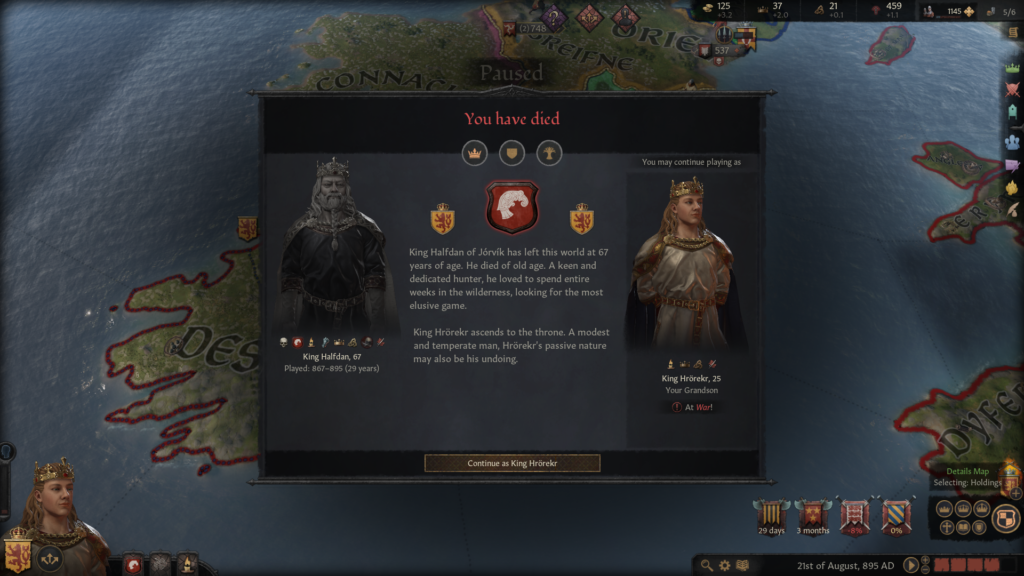
It is History in the Making
When mixing this horde of characters, their traits and families, the colossal map, the dozens of religions, cultures, and noble houses, the game opens up a nearly infinite array of stories to tell. These stories are up to you to choose and mold, and all those elements combined make every playthrough vastly unique. You could, for example, start as a king, see one of your vassals remove you from the throne and have yourself paving a path of vengeance from the lower ranks of nobility, or maybe you could create an everlasting piece of stable land, focusing on defending it against invasions and forging alliances with bigger and more military potent neighbors. You could try to establish a matriarchal society in the heart of Europe, facing the wrath of catholics and muslims at the same time. It is entirely up to you to decide what to do.
No matter what you choose, the game randomness will help to make the experience different at nearly every time. This randomness, however, can also be a bitter enemy in the fun, especially when playing at Ironman Mode, where the game saves automatically. Sometimes you may start a campaign as a low-ranked noble and be immediately attacked by massive foes such as the Byzantine Empire or the Abbasid, facing a quick and painful gameover. At other times a plague may strike you exactly where it hurts you the most, killing your heirs and ending your game. Those decisions are not simply based on what you did and sometimes reloading a previous save moments before being decimated is enough to make that attack never ever happen. It can be frustrating, but fortunately they are not that common and will only really happen in the first hours of the game, when you have less options to escape doom.
Regardless of being caused by sheer randomness or by your decisions, the story told by your playthrough can be extremely satisfying, especially because there is a LOT of content in the game, real-based informative content. There are historical dynasties, empires, nations, religions, and cultures in the game, making it a very powerful history class at some extent. Those who enjoy a bit of medieval history may create narratives derived from it, such as playing as a iberian muslim and trying to conquer western Europe instead of being pushed back to Africa, or maybe playing as norse and creating an empire dedicated to Odin and the Aesir. The amount of information the game has allows for an incredible array of possibilities. If you are not much about creating your own narrative, the game offers some scripted decisions for you to seek out too, such as removing the Papacy when playing as a pagan or muslim, or unifying Africa under a single banner and religion.
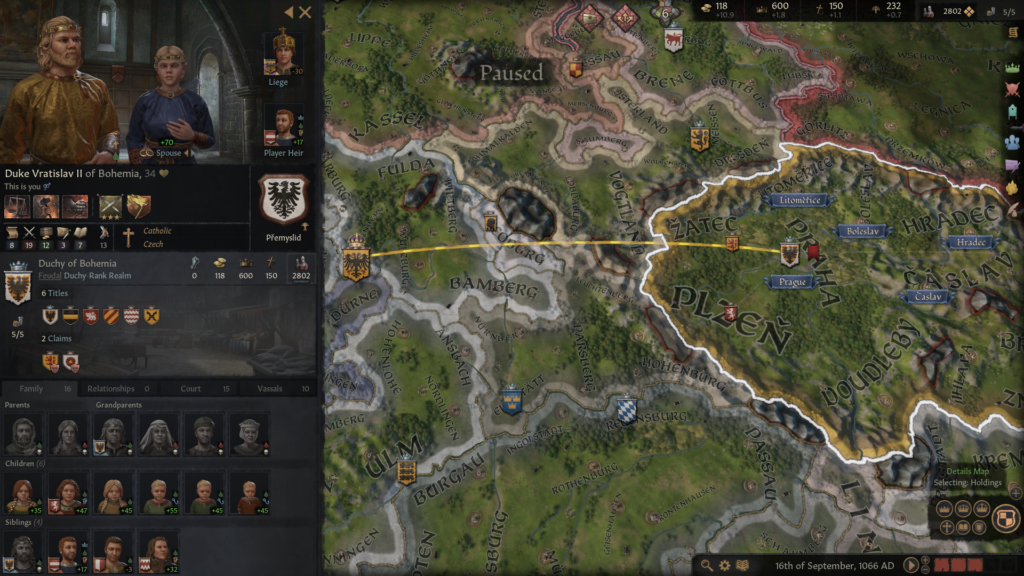
It is a Model to Follow
Crusader Kings III comes to basically set up a real high bar for grand strategy games. It mixes a roleplaying component of incredible quality to a real-time strategy with depth and lasting efficacy. Whatever the previous Crusader Kings and similar games did, it does way better and with a modern and sleek approach, allowing either longtime fans of the genre to enjoy a high-quality new entry to what they like as granting room for newcomers to try it and understand what makes this game such a masterful experience.
As usual for Paradox Interactive games, Crusader Kings III also embraces modding fully. Anyone can create a mod for the game with just some help of friendly tutorials, allowing for some incredible customization. There are already many incredible mods coming from the community, allowing you to play as vampires, descendants of greek gods, and much more. You, however, could work on your own bizarre narrative through modding too, perhaps creating some new traits for fun or having your own way throughout history by playing as an immortal almighty god. Regardless of using mods or not, they are there to ensure the game lasts even longer, offering new experiences for those who may have grown tired of what the core game has to offer (which still is enough to last for a few hundreds hours of gameplay).
Anyway, Crusader Kings III is not simply a great game, it is one of the best of the past decade, showing developers around the world that the strategy genre can offer a lot more than what we typically knew. Like the genre or not, Crusader Kings III is an experience that should be tried by everyone because of its sheer quality and also its incredible capability as an inspirational tool to learn more about medieval history, religion, and perhaps understand better how the world works the way it does even today.
Summary
-
Production
-
Content
-
Polish
-
Concept
-
Fun
